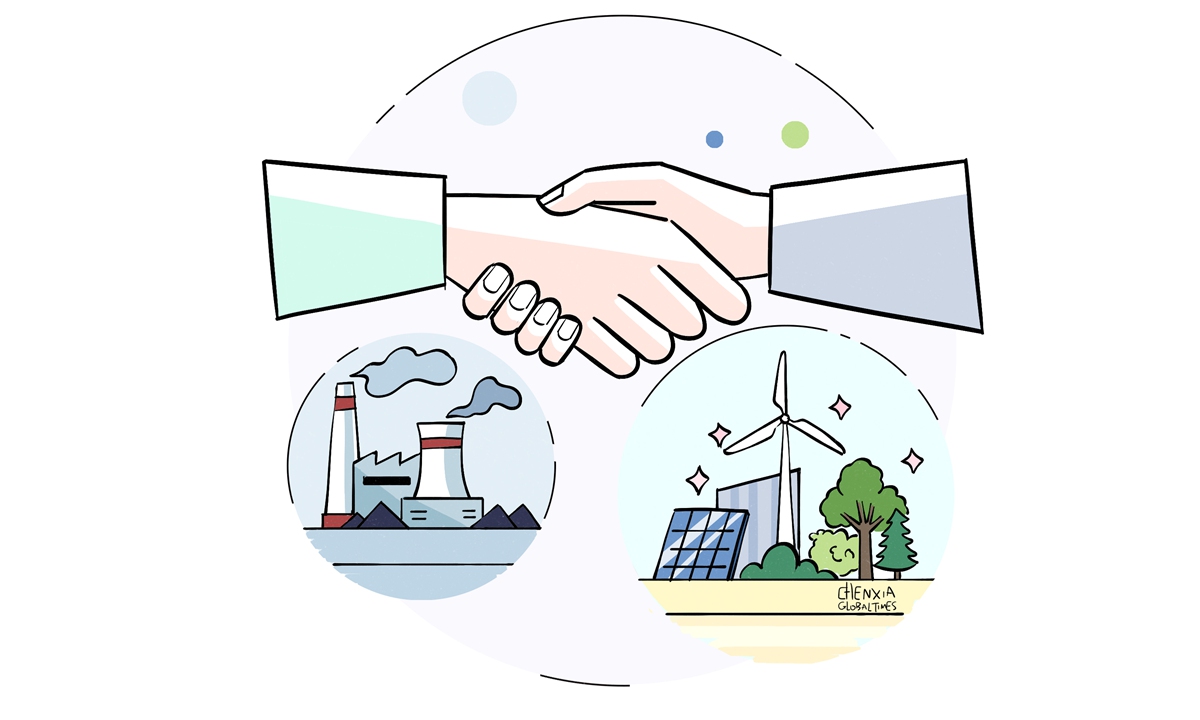
Illustration: Chen Xia/Global Times
India's economy could realize accelerating growth and its demand for commodities is likely to surge in the coming years. However, the pick-up in India's demand will be most prominent for oil and coal, which may frustrate the South Asian country's efforts to decarbonize, a report by ANZ bank said, according to CNBC.
Indeed, as an increasing number of experts believe that India, along with China and members of the Association of Southeast Asian Nations(ASEAN), will become the fastest-growing economies in the next decade, India is expected to become a significant influencer in the global commodity markets after China.
Yet, what should also be noted is that the goal to boost India's economy, heavily relying on rapidly growing energy demand, is in conflict with its decarbonization goals and efforts to advance its energy transition. It is becoming increasingly challenging for India to balance the two goals.
The energy transition has become a general trend across the world. Promoting a green transformation is also regarded by the Modi government as an important potential driver of India's economic growth.
India has implemented a green hydrogen energy plan through government investment and tax cuts, and launched energy storage projects and new-energy vehicle projects to promote its energy transition.
However, the reality is that India is heavily dependent on traditional energy sources and lacks alternative economic industries. At present, the total installed wind and solar capacity in India is only about 13 percent of that in China. Coal has an inseparable connection with industries that are concerned with the huge labor force. It won't be an easy task for the Modi government to make changes in the process of its green transformation.
India needs to take the path of cooperation, and given China's significant advantages in making an energy transition, it could be helpful to realize green growth if India deepens cooperation in this regard.
India and China have huge potential in deepening cooperation on climate change and economic development, which will bring mutual benefits to the two economies. As major developing countries, India and China have extensive common interests and broad space for cooperation in terms of how to achieve a balance between emissions reductions and development, and how to fully release the potential and dividends of the new-energy industry.
China and India have similar positions on the issue of climate change. For some time, Western countries have accused China and India of not taking enough responsibility for global climate change, but the West is the largest emitter in terms of cumulative carbon emissions. The important role of China and India in the transition to green energy is being overlooked.
China and India are emerging as leaders in deploying clean energy and replacing fossil fuels. China generates almost twice as much wind power as the US, and China's solar power accounts for one-third of the world's total, according to media reports. China is building far more renewable energy facilities than any other country. China is not only focusing on building a domestic electric vehicle market, but also becoming a major exporter of electric vehicles.
In the clean energy industry, China and ASEAN have fostered deeply intertwined industrial cooperation and mutually beneficial trade relations. In recent years, the trade of solar panels, wind turbines, electric vehicles, and related accessories and intermediate products between China and ASEAN has continued to grow. China and ASEAN members have complementary resources and industrial advantages in new energy. The two sides continue to have new cooperation plans in green, low-carbon and clean energy.
If India can abandon its geopolitical thinking and change its reluctance to deepen cooperation with China and participate in Asia's industrial chain cooperation, India's clean energy industry can get the investment it needs and obtain support in supply chains, technology and production capacity, so as to register rapid economic growth while achieving its decarbonization goals.
The author is a reporter with the Global Times. bizopinion@globaltimes.com.cn



